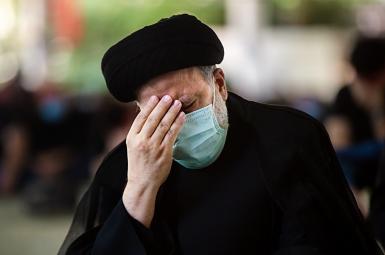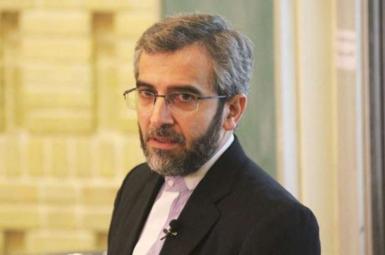
Rouhani Derides State TV For Controversial Anti-JCPOA Documentary
President Hassan Rouhani on Wednesday derided Iran's state-run TV (IRIB) for airing a documentary highly critical of the revival of the 2015 nuclear agreement and the return of the United States to the deal.
"They air the films that they produced several years ago [during the talks that led to the deal] and had become obsolete. It's Okay, they are exposing their own true nature by airing these films," Rouhani said in a televised speech at a weekly cabinet meeting on Wednesday.
The IRIB's Channel 3 on Tuesday evening aired the first of the three episodes of the "End of the Game" with the promise of the other two episodes being aired soon. The airing of the first episode of the second season of an IRGC-sponsored drama called Gando during the Persian New Year Holidays in late March had similarly become controversial.
Gando featured a British spy embedded in the Iranian nuclear negotiation team which could be seen as a thinly veiled reference to the real case of Abdolrasoul Dorri-Esfahani who was accused of spying for the British during the 2015 nuclear talk. Foreign Minister Mohammad-Javad Zarif wrote an emotional text about the perceived allegations made in the drama against him and the foreign policy apparatus on his Instagram page and the broadcast discontinued suddenly after only one episode. The opposition claimed government pressure had been responsible for the abrupt discontinuation of the broadcast.
Supporters of the Rouhani administration allege that the broadcasts are meant to turn the public against the talks between Iran and the other participants in 2015 agreement, known as the Joint Comprehensive Plan of Action (JCPOA), that started in Vienna on April 9. "Airing the documentary End of the Game, right in the middle of JCPOA talks, reveals the true face of those who consider a life not under [US] sanctions impermissible for the people [of Iran]," journalist Maryam Salari tweeted.
"They produce Endless Game and Gando to show once again that they don't have any commitments to the political principles of dignity, knowledge, expediency and national interest. If they did, they would have accepted that all of the [country's] forces, institutions and officials tribunes should support the official foreign policy apparatus," reformist politician Azar Mansoori who is a member of the National Trust Party tweeted on Wednesday.
The producer of the documentary, Mohsen Haj-Karami, has close affiliations with the small but quite influential ultra-hardline Jebhe-ye Paydari Fron (Endurance Front). Many have, accordingly, blamed the Paydari group for the IRIB's antagonistic approach to the possible revival of the JCPOA and the Vienna talks. They have also alleged that hardliners are trying to even sidestep Khamenei despite always claiming total obedience to him. In a speech a week ago, Khamenei gave his blessing to the negotiators but ordered them not to allow the talks to become "attritional". Most hardliners have toned down their criticism of the talks since Khamenei's speech.
Journalist Saba Azarpeik, in her tweet on Wednesday pointed out that the IRIB's airing of the documentary demonstrates the "power structure broken into two in the most evident way" with the opponents of a deal acting against Supreme Leader Ali Khamenei's explicit approval of the Vienna negotiation team. "This is no longer a misunderstanding, supporters of the [views expressed in the documentary] are sidestepping the Leader."
"This is not the first time that those who claim absolute obedience to velayat [leadership of religious jurisprudent] are taking a conflicting stance against the leader and his advice. Neither will it be their last time," another journalist, Saeed Maaleki, tweeted.








